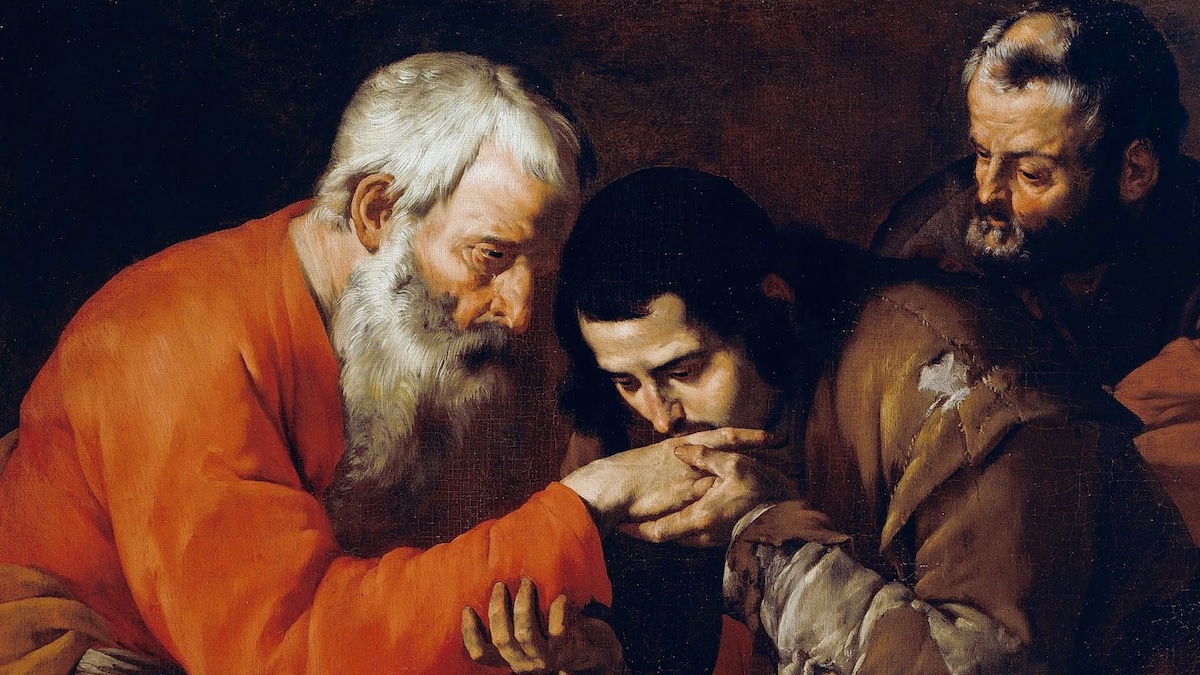In 1985 the country of Lebanon in the Middle East was undergoing something of a civil war, marked by terrorism, bombings, and frequent fighting among rival groups. It was a very dangerous place, even for journalists—as an American named Terry Anderson discovered. He was a reporter for the Associated Press, and on March 16 of that year, three men seized him at gunpoint and held him as a hostage—an ordeal lasting 2,454 days (a period of over six and-a- half years). At first Anderson was kept under appalling conditions; he was blindfolded most of the time, held in chains, and interrogated roughly. He realized that he was slowly losing his mind under the pressure, so at the risk of antagonizing his captors, he finally insisted, “I can’t do this anymore. You can’t treat me like an animal; I am a human being.” When his surprised captors asked what he wanted, short of his freedom, he said, “I want a Bible”—and, almost miraculously, he was given one a few days later. Though still in chains, Anderson managed to pull off his blindfold and begin reading. He had been raised a Catholic, but had not practiced his faith for many years—but now it became the most important thing in the world to him. He had plenty of time to read the Scriptures and ponder his life, and he realized he had a lot to be sorry for; he had made many mistakes and had hurt many people, especially his wife and daughter, and he came face-to-face with the fact that he had been a selfish, unloving person.
A few months later Anderson learned that there were other hostages living next door to him, including Fr. Lawrence Jenco, a Catholic priest. He told his captors, “I am a Catholic, and I want to talk to the priest”—and his wish was granted. Fr. Jenco was brought into Anderson’s room. It had been twenty-five years since his last confession, and Anderson poured out his heart to the priest, admitting his many sins and failings; when he finished, both priest and penitent were in tears. Fr. Jenco absolved him, and then proclaimed, “In the Name of a gentle, loving God, you are forgiven.” Terry Anderson’s life turned around as of that moment—so much so that when he and the other hostages were finally released several years later, he publicly forgave his captors (Richard Jensen, Lectionary Tales, p. 15). Life is easier when we remain in God’s grace and remember our need for Him; the Lord is pleased when our love for Him keeps us from straying away from Him in the first place. However, as the story of Terry Anderson reminds us, even if it takes adversity to bring us back to our senses, God will always take us back.
Having reached the halfway point of Lent, the Church reemphasizes the importance of admitting our sins and trusting in God’s mercy. The Lord said to Joshua (Jos 5:9, 10-12) and the people, “Today I have removed the reproach of Egypt from you”—meaning their slavery in Egypt, and the many years afterwards when they wandered in the desert in punishment for their sins. In a sense, God our Father says the same thing to each one of us personally when we receive the Sacrament of Reconciliation; the Lord frees us of our sins and takes away the guilt or reproach we bear. As St. Paul (2 Cor 5:17-21) proclaims, “Whoever is in Christ is a new creation.” Moreover, as he says, we share in the message and ministry of reconciliation.
Indeed, we are called to be living signs of God’s divine mercy. This is what Fr. Jenco did for Terry Anderson; instead of bemoaning his own fate or giving into despair over his captivity, an imprisoned priest gladly offered the Sacrament of Reconciliation to a repentant fellow prisoner. Jesus calls us to show similar compassion whenever we have the chance; the parable of the Prodigal Son (Lk 15:1-3, 11-32) was addressed not only to sinners who needed to learn to believe in a merciful Father, but also to the scribes and Pharisees who acted out of self-righteousness in judging others. They were like the older son who resented the fact that his younger brother was forgiven and welcomed back. The older brother did not bear the reproach of disloyalty to his father and immoral living, as did the younger son, but he took upon himself an even greater reproach: a judgmental and unforgiving heart.
When it comes to remaining faithful children of our heavenly Father, we’re supposed to be like the obedient older brother, not the younger one who was wild and irresponsible—but when it comes to the painful reality of sin and failure, we’re supposed to be like the younger son who trusted in his father’s forgiveness, not the older one who was angry and self- righteous. As the father said to his older son, “Now we must celebrate and rejoice, because your brother was dead and has come to life again; he was lost and has been found.” As Jesus tells us, we too are supposed to rejoice when sinners return to God; as St. Paul explains, we too are called to be ministers of reconciliation, helping people turn back to their loving Father. There are three important ways in which we can do this. First of all, we must humbly and honestly admit that we ourselves are sinners; this means not only that we will seek God’s forgiveness, but we’ll also remember that our own sins disqualify us from passing judgment on others. Nothing turns off other people more than hypocritical, self-righteous Christians; nothing is more attractive than members of a Church who act in God’s Name by being loving, accepting, and understanding. Secondly, we must forgive those who hurt or offend us, rather than passing judgment or holding grudges against them. There are many cases of terrible criminals whose wasted, hopeless lives have been completely transformed because their victims were able to forgive them; our efforts to forgive others, whether in big things or little things, will many times be the proof they need that God Himself can be trusted to be merciful.
Thirdly, we must constantly pray for the conversion of sinners; we must offer our sacrifices and prayers that those who’ve so far resisted God’s love will finally accept the grace of repentance. There are many intentions dear to our heavenly Father’s heart, but none quite so important to Him as this one; if our prayers contribute to the salvation of someone who might otherwise be lost, we will have performed an act of love whose beauty and glory will last forever.
It shouldn’t take a terrifying, life-threatening ordeal, such as Terry Anderson experienced, to make us trust in God’s mercy, or to make us generous in sharing it with others. As Christians, these are things we should already be doing, and our efforts to live in this spirit can make a difference in the lives of those around us. Jesus speaks to us of a loving, merciful, and compassionate Father—and if we place our trust in Him, we will never be disappointed.








